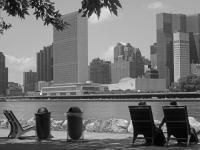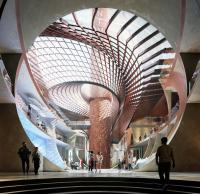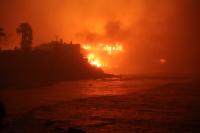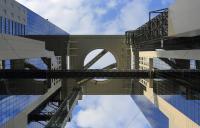Oasia Hotel Downtown
Singapore, Singapore
A verdant tower of green in the heart of Singapore’s dense Central Business District (CBD), Oasia Hotel Downtown is a prototype of land use intensification for the urban tropics. Unlike the sleek and sealed skyscrapers that evolved out of the temperate west, this tropical “living tower” offers an alternative image to the sleek technology of the genre.
In response to the brief for distinct Offices, Hotel & Club rooms, WOHA created a series of different strata, each with its own sky garden. These additional “ground” levels allow generous public areas for recreation and social interaction throughout the high-rise, despite the inner city high density location.
Closely overlooked by surrounding towers, the tower carves out its own internal spaces and dynamic views instead of relying on external vistas for visual interest. Each sky garden is treated as an urban scale verandah, sheltered at high level by the preceding sky garden and open sided for formal and visual transparency. The openness also allows breezes to pass through the building for good cross-ventilation. In this way, the public areas become functional, comfortable, tropical spaces with greenery, natural light and fresh air instead of enclosed, internalised air conditioned spaces.
Landscaping is used extensively as an architectural surface treatment and forms a major part of the development’s material palette both internally and externally. Achieving an overall Green Plot Ratio of 1,100%, the tower is conceived as a haven for birds and animals, reintroducing biodiversity into the city. This quantum of green is an exciting number, as it effectively compensates for the lack of green in 10 surrounding buildings. The tower’s red aluminum mesh cladding is designed as a backdrop that reveals itself in between 21 different species of creepers, with colourful flowers interspersed among green leaves, providing food for the birds and insects. The creepers will form a mosaic with each type taking over its most suitable conditions of light, shade and wind. Instead of a flat roof, the skyscraper is crowned with a tropical bower; floral, diverse, soft and alive.
Building General
What is the height of the building? 190.15m.
How many sky terraces are there? Total 4 nos of sky terraces located at 6th storey, 12th storey, 21st storey and 27th storey.
How many structural cores are there in the building? Total four structural cores in each corner of the building to free up space within the tower for external urban spaces in the sky. This is unusual as the core is usually located in the centre of the building in typical skyscrapers.
How many lifts are there in the building? 13 lifts in total. 8 lifts for hotel serving different type of rooms, 3 lifts for office and 2 service lifts.
How many hotel guestrooms are there? 314 rooms.
Why is the office called PS100? The office comprises of 100 units. As the building is located on Peak Seah Street and the address is 100 Peak Seah, the office is thus named PS100.
Greenery
How many species of creepers on the facade? The facade is made up of a total of 21 species of creepers to ensure the green facade is always lush and resilient during different weather conditions. Arrangement of different species on elevation is according to their preference of sunlight, resilience to wind and growth speed to maximize their adaptability.
How many species of plants and trees in the development? In addition to 21 species of facade creepers, another 33 species of plants and trees are selected, making a total of 54 species of plants and trees to improve bio diversity in the downtown city centre.
What is the total number of façade planter boxes? 1793 nos of façade planter boxes.
What is the size of the planter box? A standard planter box is 1100(L) x 650(W) x 1050(H) to ensure lush plant growth.
Façade
What is the design rationale of the red façade mesh? Red color gives good contrast to the lush greenery and cool blue sky to allow the building to stand out amongst the dull colored downtown skyscrapers. This is similar to how warm hues of fruits and flowers contrast against green foliage and earth in nature.
How many colors make up the facade mesh? A total of 5 warm colors gives visual interest and complexity to the facade when viewed up close.
What is the total area of the expanded mesh? 25490 sqm of area for growing the largest green facade!
Crown
What is the height of the roof crown structure? 42.9m equivalent to 13 hotel floors
How heavy does the roof crown weigh? 231 tonnes.
- Architects
- WOHA
- Location
- 100 Peck Seah Street, 079333 Singapore, Singapore
- Year
- 2016














